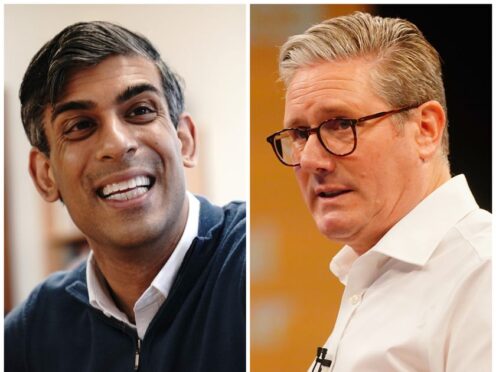This feature of claims from the campaign trail has been compiled by Full Fact, the UK’s largest fact checking charity working to find, expose and counter the harms of bad information, as part of the PA news agency’s Election Check 24.
Analysis conducted by Full Fact using artificial intelligence (AI) examining Facebook posts by 1,540 parliamentary candidates from all parties has found more than 300 repeats of misleading claims.
Conservative candidates were responsible for the majority of these repeated claims. Full Fact’s AI tools flagged 188 posts by Conservative candidates containing a misleading claim which has been fact checked by Full Fact — but the Labour Party was not far behind with 117 claims flagged.
All of the posts by Conservative candidates identified by Full Fact contained the party’s most prominent misleading claim of the campaign: that a Labour government would lead to a £2,000 tax increase for a working family.
Conversely, claims by Labour candidates included a broader range of claims, including 39 repeats of the unreliable claim that a Conservative government would lead to £4,800 increase in mortgage payments and 43 repeats of the outdated claim that Labour’s net zero plan would cut energy bills by £300.
Posts including the six misleading claims identified by Full Fact’s AI tools were shared 565 times, creating a potential reach of more than 2.5 million people.
Chris Morris, chief executive of Full Fact, said: “Scare tactics based on fudged numbers have dominated so much of this campaign right up to the final week, and that’s a disservice to democracy. It should shame both of the largest political parties.
“For whoever is in Number 10, the long overdue work to repair battered trust in politics must begin on July 5th.”
The £2,000 tax increase has become one of the most high-profile claims of the campaign, featuring in the debates and across Conservative party messaging. Despite prominent debunking from Full Fact and others, Conservatives have continued to push out the claim—59% of the claims flagged in this analysis occurred after the figure had already been fact checked.
Similarly, high-profile challenge to Labour’s speculative £4,800 figure has not prevented the party from deploying the figure in the campaign, as recently as last week in a stunt that plastered the figure across the front of a building.
Full Fact’s claim matching tool, which incorporates Google’s BERT model, examined 76,663 Facebook posts by 1,500 candidates over the course of the election campaign (22 May – June 30). The AI model searches for sentences that semantically match claims that have been previously checked, debunked, or corrected by Full Fact. It found 311 repeated claims:
– 188 repeats of the Conservative claim that working families would face a £2,000 tax increase under Labour (111 after fact check published)
– 43 repeats of the Labour claim that Labour net zero policy would cut energy bills by £300 (8 after fact check published)
– 39 repeats of the Labour claim that Conservative spending commitments would lead to a £4,800 mortgage increase (29 after fact check published)
– 26 repeats by Labour of the claim that there are 7.8 million people on NHS waiting lists (All after fact check published)
– 9 repeats of the Labour claim that families are £5,883 worse off under Rishi Sunak (1 after fact check published)
– 6 repeats of the Scottish National Party claim that the Scottish Child Payment is keeping 100,000 children out of poverty (5 after fact check published)
As not all candidates have a Facebook account used for their campaigns, the results are a snapshot of social media activity rather than a representative sample of all candidates from all parties.
